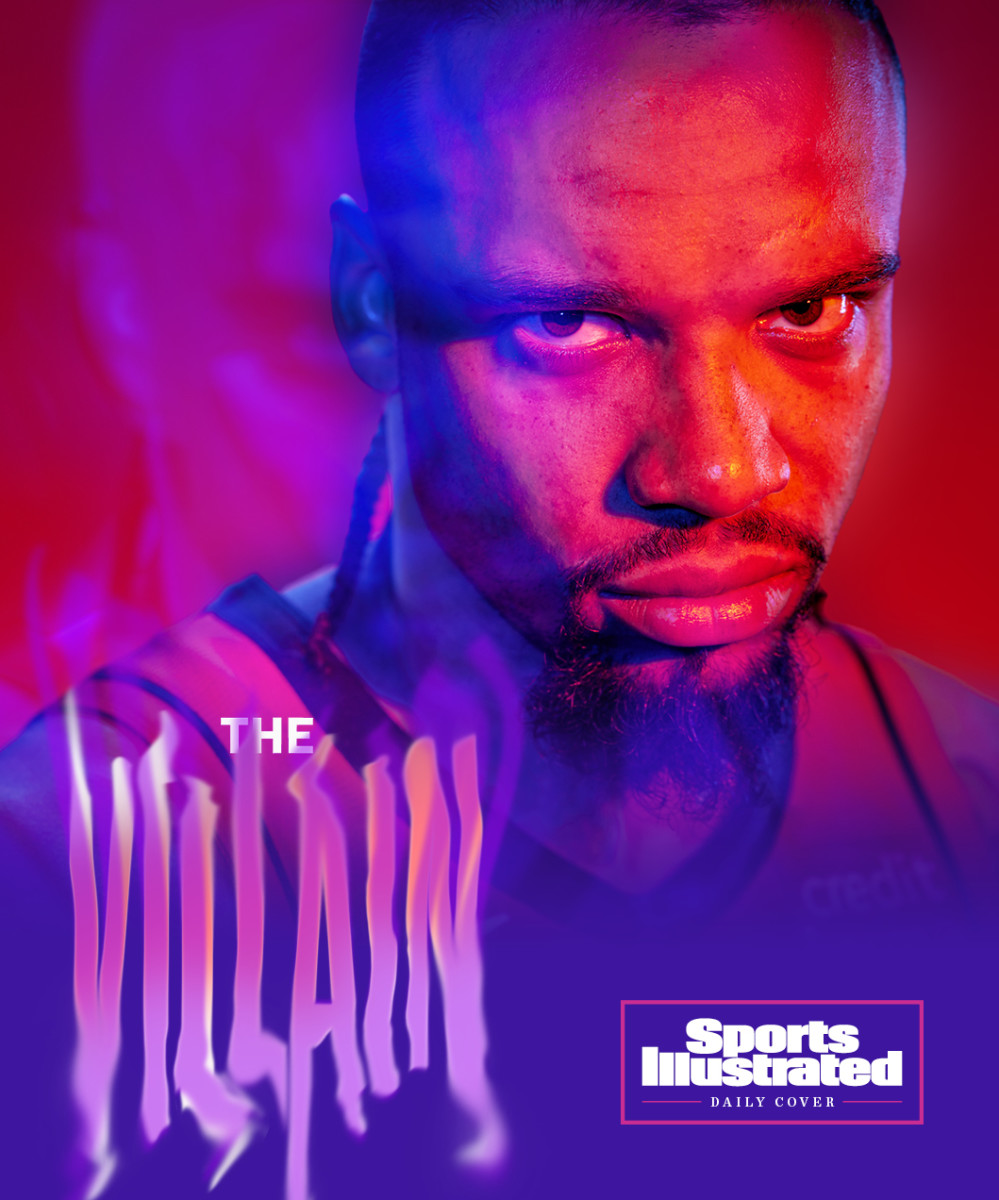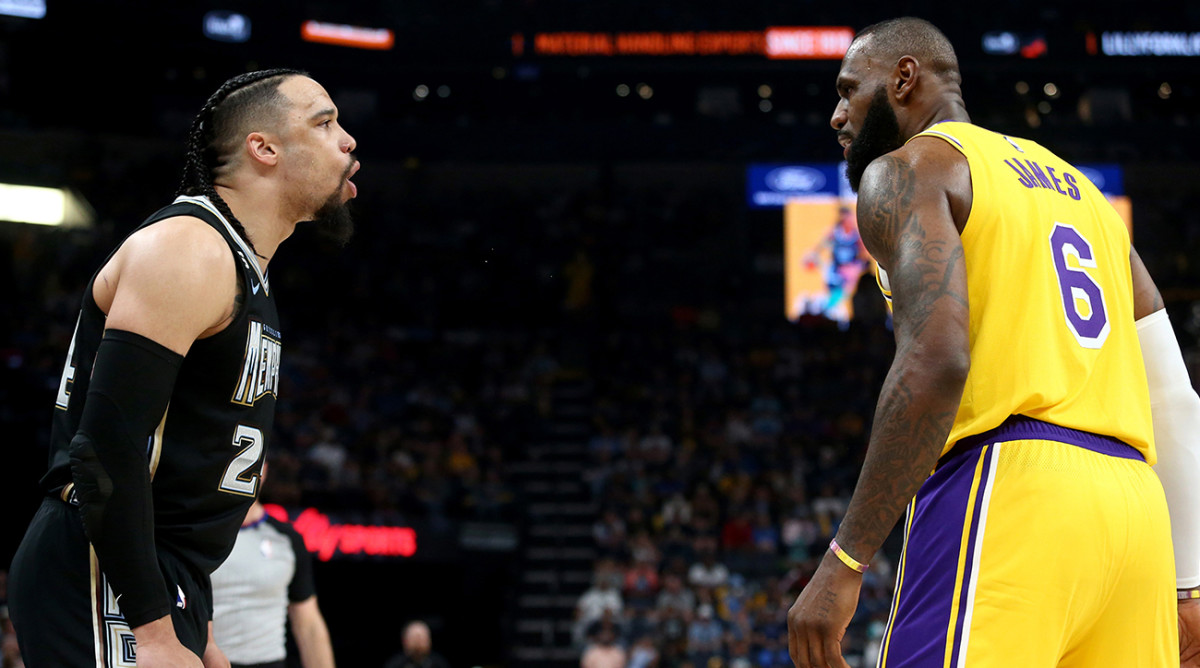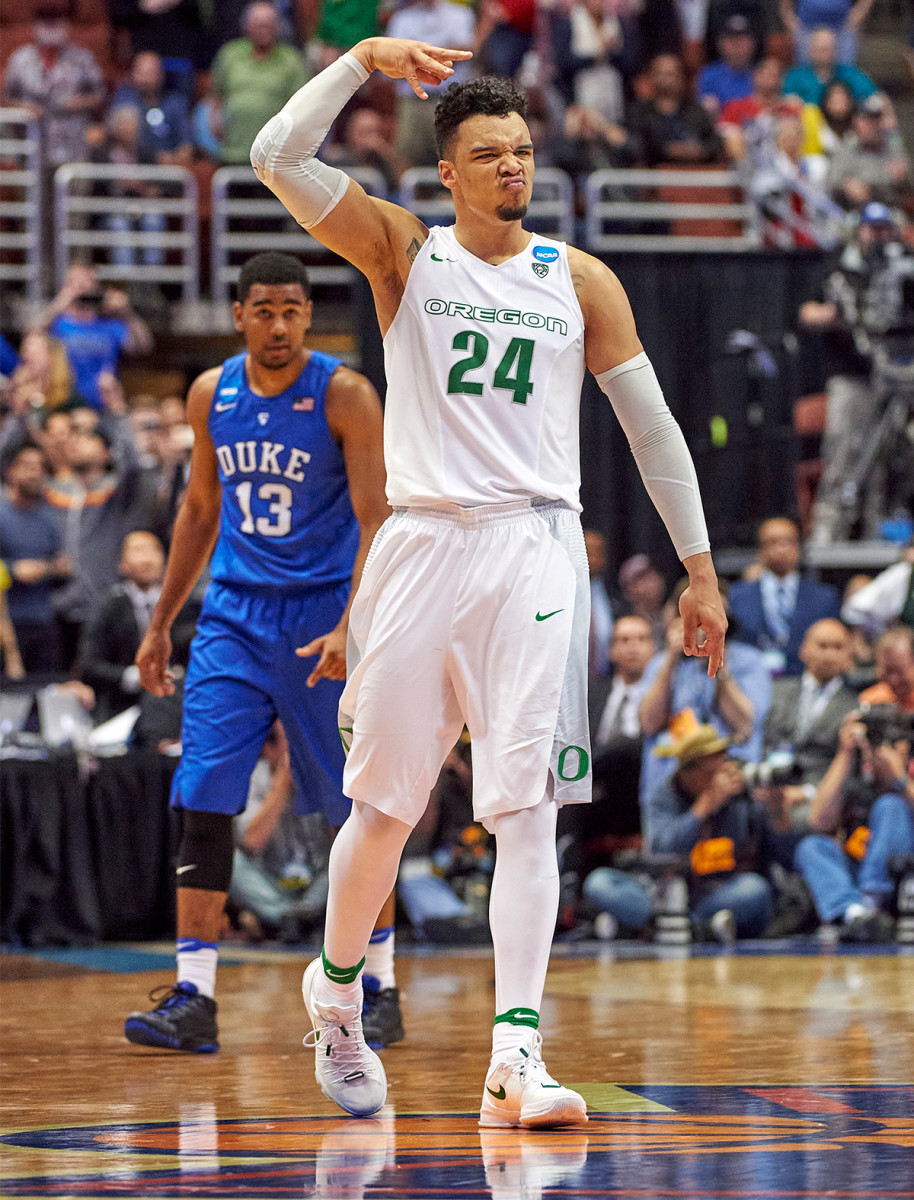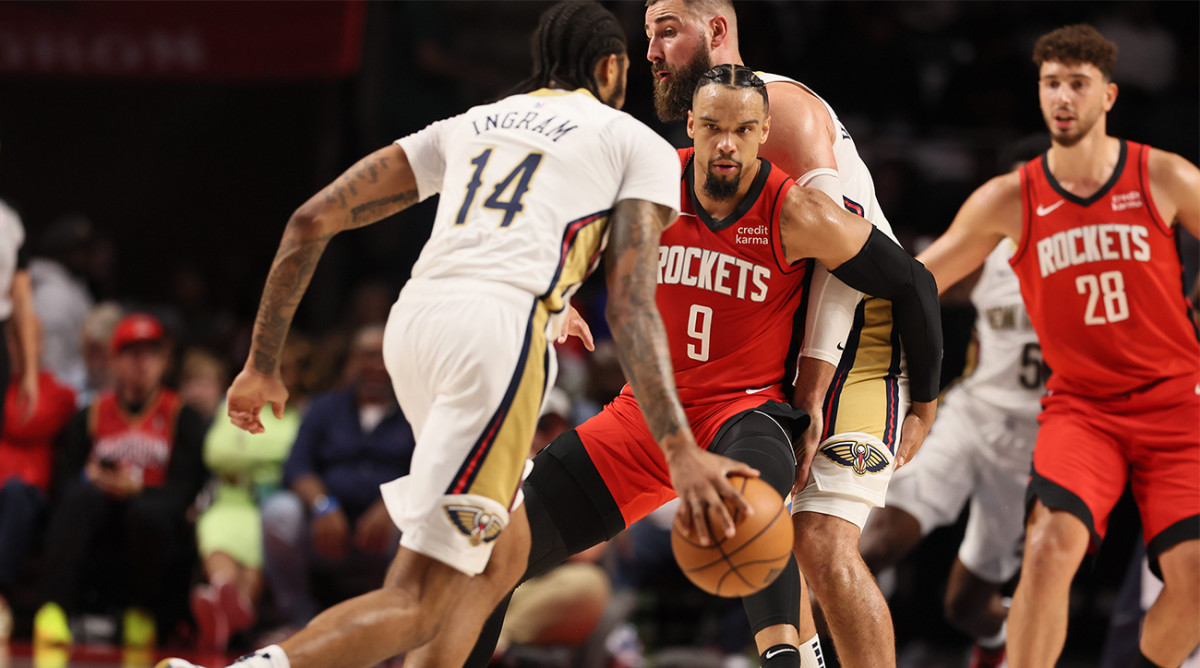Rockets’ Dillon Brooks Doesn’t Mind Being an NBA Villain

Call him a villain. Dillon Brooks doesn’t care. Say he’s arrogant, a bully, toxic to a team. He’s heard it, read it, doesn’t think much of it. “Everyone wants to hate on something,” says Brooks. Say he’s the reason for the Grizzlies’ first-round elimination from the playoffs last April, because early in the series against the Lakers he had the gall to publicly poke LeBron James. He thinks it’s stupid, but whatever. “We didn’t have our whole squad, and they did,” says Brooks. “People forgot about that. Just threw it on me.” The bad guy? Villain Brooks? He doesn’t want the label. But he’ll wear it. “Everyone can’t be the hero,” says Brooks. “I’d rather be what was chosen for me.”
Chosen. On this point, Brooks is emphatic. He didn’t dream of being scorched on a podcast by Draymond Green, scuffling with Donovan Mitchell or engaging in a brief blood feud with James. At Oregon, Brooks’s viral moment was being admonished by Duke’s Mike Krzyzewski in the handshake line after he took a late three in a blowout NCAA tournament win. “His fault,” says Brooks. He didn’t set out to be an enforcer. And a villain? “Not really,” says Brooks.“Because villains never win.”

Peel back the layers, though, and you’ll find a story more inspirational. A pudgy seventh grader turned high school star. A prep player who became a Division I prospect. A starter at Oregon who led his team to the Final Four. A second-round pick who made an NBA roster. A role player who has become one of the league’s top defenders. “He is the poster child for a guy who literally worked his way into the NBA,” says Mike Mennenga, a longtime Oregon assistant.
Last summer Brooks was part of the Canada team that finished third at the FIBA World Cup. In the bronze medal game against the U.S., Brooks ripped off 39 points, and he was named the tournament’s top defensive player. Team Canada coach Jordi Fernandez suggested those who don’t like the way Brooks plays “don’t like basketball.”
That story doesn’t get much attention, of course. Some of that’s on Brooks. Most of it, really. He started the feud with Green, telling ESPN in the spring, “I don’t like Draymond at all,” adding that Green would be nothing if he weren’t a Warrior. He sparked the scuffle with Mitchell in February when he swung his arm wildly and hit the Cleveland guard in the groin. (Mitchell retaliated by throwing the ball at Brooks and charging at him.) He stood in front of his locker after Game 2 of Memphis’s opening-round series against the Lakers and dismissed some on-court jawing with James by saying he didn’t care because LeBron was old. “I poke bears,” Brooks said. Turns out, they poke back: The Lakers won three of the next four after that, with James clinching Game 4 with a driving layup into Brooks’s chest.

Indeed, Brooks’s basketball wounds are largely self-inflicted. Durable, 6'6" wing defenders are coveted in today’s NBA. There’s a reason the Grizzlies let one of the best walk away.
In late September, inside a chilly gym at McNeese State, where the Rockets opened training camp, Brooks squeezes into a straight-backed seat in the bleachers. Houston, desperate to improve defensively, signed Brooks, 27, to a four-year, $86 million contract in July. Of the end in Memphis, Brooks is bothered but unapologetic. “It wasn’t what I wanted,” he says. “The whole season was not what I wanted. I feel like we did better when I was a focal point in that organization. They chose a different route. But I’m happy that through all the bulls--- I was able to get what I always deserved.”
In Memphis, Brooks was part of a contender. In Houston, he will try to help build one. The Rockets are the biggest surprise in the early season, jumping out to a 6-3 record, punctuated with a win over Denver on Sunday. Brooks is averaging 13.7 points while shooting career-best from the field (55.1%) and the three-point line (53.3%). He has a higher true shooting percentage (69.1) than Stephen Curry (68.6) and is a leader on Houston’s shockingly stingy top-five defense.
Anyone expecting a different player, though, will be disappointed. There was no epiphany. There will be no changed man. (In the Rockets’ preseason opener, Brooks was ejected after five minutes for—stop us if you have heard this before—whacking Indiana’s Daniel Theis below the belt.) “[The Grizzlies] relished the way I played because it made everybody play harder, play better, play with a certain swagger,” says Brooks. “That’s what I’m going to bring in this team. That’s how we’re going to play.”
East Preston, Nova Scotia, is a seaside town on the eastern shore of Halifax, a historically Black community nestled on the coast of a predominantly white country. Brooks’s basketball roots trace to Mississauga, the Toronto suburb where Brooks was raised by his mother, Diane. His toughness and physicality? That comes from East Preston, where his father, Wayne, grew up.
“City boy,” is what they called Brooks there. He hated that. “I always wanted to be a country boy,” says Brooks. “Rough around the edges.” As a youth, summers were spent in Nova Scotia. There was a little basketball and a lot of fighting. “Grimy,” is how Brooks describes it. But he loved it. “I got to see my family, my roots,” he says. “Seeing where my dad was from, the grind he went through. It taught me that you always have to go get what you want.”
As a teenager, Brooks was, by most accounts, doughy. “He was out of shape,” says Mennenga, who has known Brooks since middle school. He recalls coaches pushing Brooks toward football, but he preferred to compete with Jamal Murray, Andrew Wiggins and other up-and-comers in the Canadian basketball pipeline. “He wasn’t having it,”Mennenga says. “He had the DNA of a competitor. His mind, even back then, was locked in on becoming the guy he is today.”

Brooks spent three years at Father Henry Carr High, just outside of Toronto. Before his senior year, in 2013, he transferred to Findlay Prep, outside of Las Vegas. Playing behind Kelly Oubre Jr., Brooks averaged 8.4 points per game. Oregon, though, loved his energy. Taking charges. Diving for loose balls. Reaching for deflections. “We needed that,” says Ducks coach Dana Altman. “Everyone wants to score. He tried to make winning plays.”
At Oregon, Brooks underwent a transformation. His body changed. Offensively, the Ducks played fast. Defensively, they pressed. Conditioning became a focus. The cakes, cookies and candy that were part of his high school diet? Gone. He became a fixture in the weight room. As a freshman, Brooks had 17% body fat. By the end of his junior year, it was down to 8%. “He’s a basketball monk,” says Mennenga. “He lives and breathes it. It’s a lifestyle.”
Brooks dived into film study. He devoured scouting reports. “He knew everyone’s tendencies,” says Mennenga. In Oregon’s matchup zone defense, Brooks, says Mennenga, “was our middle linebacker.” His competitiveness was contagious. His sophomore year, the Ducks advanced to the Elite Eight. The next year, they made the Final Four. Before the regional final matchup against Kansas, there was a nervous energy in the locker room. Brooks gathered the team together. On the wall there was a sign. ROAD TO PHOENIX, it read. We’re going, Brooks said. Whatever it takes. The Ducks beat Kansas by 14, holding the Jayhawks to 35% shooting from the floor. “We had some competitive guys,” says Altman. “But Dillon was definitely the instigator.”
In 2017, Brooks declared for the NBA draft. The Pac-12 Player of the Year, Brooks hoped to be a first-rounder. But there were concerns about his length. His athleticism. His attitude. NBAdraft.net wrote that it was “uncertain whom he will be able to guard at the next level.” Crazy, Mennenga thought. “He can press a superhuman button and do things you feel like his body is not capable of doing,” he says. On draft night, Brooks slipped to the middle of the second round, where the Grizzlies snapped him up.
In Memphis, Brooks started over. David Fizdale, then the Grizzlies’ coach, was blunt. If Brooks was going to stick, he had to defend. Brooks listened. He doubled down on scouting. Two hours in the film room. Took the iPad home at night. He focused on discipline. “Guys in this league are really good at drawing fouls,” says Brooks. And he was determined to be physical. In his third season, Brooks led the league in fouls committed. The next year, same thing. His thinking: If I play physical all the time, eventually referees will have to let some of it go. “If they are going to keep calling fouls on me because I’m playing physical within the game, then it’s going to look bad on them,” says Brooks. Last season he averaged 3.3 fouls per game, the lowest in a full season since his rookie year.
He grew to love his role. Offense comes and goes. Defensively, Brooks reasoned, he could make an impact every night. “I’m not a LeBron or a Kawhi Leonard,” says Brooks. “I’m not a freak athlete. I’m just another human being, like everyone else. But I play hard. Harder than most people. Guys are used to them bowing down to them, thinking they are LeBron or Damian Lillard or Paul George. To me they are regular humans, like me, with strengths you have got to cut off.”
Watch the NBA with Fubo. Start your free trial today.
Brooks wants to clarify something. The criticism did bother him. For a while, anyway. Days after the Grizzlies’ season ended, Brooks tumbled down a social media rabbit hole. He read the comments on Instagram. On X, formerly known as Twitter, he scrolled through the replies. He saw everything. Machine Gun Kelly dropping his name in a freestyle (“Come back like LeBron and drop 40 on you like I should”). James, quoting Jay-Z lyrics, dissing him. (“Unlike you little I’m a grown ass man.”) Anonymous followers burying him. “LA Fitness Draymond,” one wrote. “Tired wrestling heel,” posted another. Suggestions that Brooks’s next stop would be in China briefly had the Shanghai Sharks trending. “That’s when I realized how big the Lakers were, how big LeBron James is,” says Brooks. He shrugs. “It’s part of my life. It’s going to make me a better player.”

Brooks hoped Memphis would support him. Instead, the franchise cut him loose. At a season-ending press conference, Grizzlies GM Zach Kleiman declined to address Brooks’s future. Days later, The Athletic reported the team informed Brooks he wouldn’t be back “under any circumstances.” In March, Memphis coach Taylor Jenkins had called Brooks the player who “epitomizes” the program. By May, that program wanted him gone. “What I didn’t like about Memphis was they allowed that so they can get out of the woodwork, and then I’m the scapegoat of it all,” says Brooks. “That’s what I didn’t appreciate. And then ultimately they’ll come to me on the low, as men, one on one and tell me something, but then not defend me when everything went down.”
In Houston, team officials watched with interest. For months, the Rockets had studied Brooks. They needed defenders. The Grizzlies finished in the top six in efficiency in each of the last three seasons, with Brooks regularly guarding opposing teams’ top perimeter players. They needed veterans. Winning veterans, preferably. Memphis made the playoffs in each of the last three seasons. The swagger, the confidence, the attitude? Houston, with win totals in recent years that looked like locker combinations, desired that, too. “Fundamentally, we want the player we saw in Memphis,” says Rockets GM Rafael Stone. “The aggression, the competitiveness, the willingness to do whatever it takes. That’s what’s attractive to us.”
To new coach Ime Udoka as well. After accepting the Rockets job in April, Udoka pondered Brooks. He liked his influence on Houston’s young core. “We wanted veterans who had been through a lot,” says Udoka. “What I embrace may not [be] embraced at other places … I don't mind physicality and chirping and doing whatever on the court. You just need to back that up.” In camp, Brooks embraced leading a group of young players. His message to them is what he told himself in high school, in college, in the NBA: Every day, try to get 1% better.
And Memphis? In September, at the Rockets’ media day, Brooks had a chance to turn the page. He could have punted on questions about the Grizzlies. Shifted the conversation to Houston. Nope. He said the Grizzlies’ decision to move on left a “big chip” on his shoulder. He called getting four games against Memphis—the first coming Nov. 22, in Houston—“amazing.” He said the games were “circled on my list.”
That’s Brooks. Once, he wanted to win a championship in Memphis. Now, his experience there fuels him. “It prepared me for what I’m about to be this season,” says Brooks. “Taking my game to a new level, my body, my mind to a new level. Cutting out the bulls--- and just hooping. I’ve got a team that wants me, that wants me to help them grow.” He pauses, circling back to a term he used earlier. Focal point. He thought he was that in Memphis. He knows he is in Houston. “For years to come,” adds Brooks.
Villains always lose in movies. In the NBA, they just might win.
